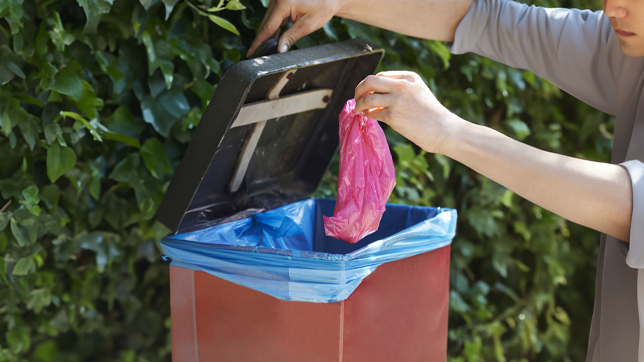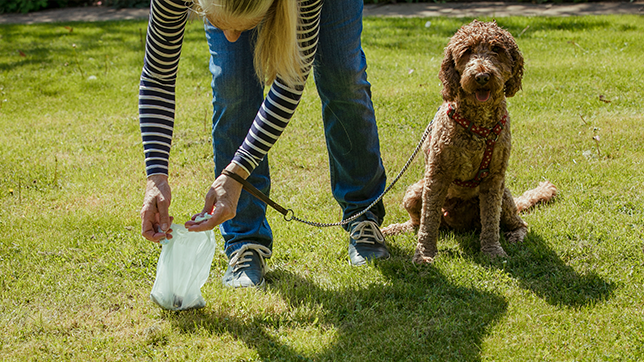6th March 2024
Dog poo – dangers and disposal etiquette
Dog poo may not be the most glamourous of topics, though it’s one we pet parents have to deal with every day!
Do your daily dog walks take you to places of outstanding natural beauty? Do you make the most of nature’s tranquillity in your local park? Or, do you and your canine companion prefer urban adventures?
Wherever you choose to exercise your dog, it’s your legal responsibility to clean up after them.
According to the law, if you fail to clean up your dog’s poo you could be taken to court and fined up to £1,000.
Why is it important to clean up dog poo?
You may be wondering why communities and local authorities are so concerned with the issue of dog mess. So, here’s a list of reasons that show how cleaning up your dog’s mess is essential for the health of you, your dog, your local community, and the environment.
- Dog poo is an environmental pollutant, since it contains upwards of 23 million microorganisms of bacteria (twice as much as human poo!).
- The harmful diseases and viruses contained in dog poo, including E.coli, can be passed onto humans if the mess isn’t properly cleaned up.
- Dog poo can contain the Toxocara worm, which is known to cause toxocarisis – leading to dizziness, seizures, asthma, blindness, and breathing difficulties; which makes it especially dangerous to children.
- Often, people won’t notice dog mess on the path or grass in front of them until it’s too late, leading to poo being transferred onto shoes, pushchairs, and wheelchairs.
- Leaving dog poo dangling from tree branches or thrown into hedges/fields can have a devastating impact on wildlife and livestock, causing serious health problems and even death. For example, a dog-mess-related illness called neosporosis causes cows to abort their unborn calves, whereas sarcocystosis causes neurological disease and death in sheep.

Are you a picker or a flicker?
Are you passionate about picking up after your pet in an environmentally friendly way? Or are you more of a flicker, instead?
The guidance given to dog walkers by some local authorities is to use a stick to flick your dog’s poo off the pathway should you forget poo bags. If walking your dog in the middle of nowhere, without access to poo bags or bins, it can be tempting to follow that advice to flick their poo aside. However, please follow local guidelines about flicking your dog’s poo off pathways.
Remember: It’s important never to flick your dog’s poo anywhere that other animals or people could access it, e.g. avoid flicking poo near livestock fields or in parks.
It’s always preferable to pick up after your pet, no-matter the situation you find yourself in. Here are some of our top tips for managing your dog’s poo in a respectful, hygienic, and environmentally friendly way:
Do
- Use biodegradable, recycled plastic, or compostable doggy poo bags.
- Throw the bag of your dog’s poo into a designated dog waste bin.
- Invest in a super-hygienic, leak-proof, dog waste carrier if you know you’re adventuring somewhere without a bin, e.g. the Dicky Bag.
- Take your dog’s poo bag home, should you be unable to find a suitable bin.
- Carry hand sanitiser to clean your hands after binning the poo bag.
Don’t
- Be afraid to ask a fellow dog walker for a poo bag if you’ve forgotten yours.
- Assume that dog poo is the same as wildlife or livestock poo (it isn’t!).
- Presume someone else will clean up your dog’s mess for you.
- Trust anyone who tells you dog poo can be used as fertiliser for edible plants.
- Believe the rain will ‘wash away’ your dog’s poo.
- Put your dog’s poo down a drain (it’ll cause a disgusting blockage!).
- Throw your dog’s poo into a residential bin.
- Hang your dog’s poo from a tree branch.
- Fail to clean up your dog’s poo.
Biodegradable vs. recycled plastic
Now you’re comfortable with the reasons for picking up your dog’s droppings, it’s time to settle the ‘poo bag’ debate!
There’s a lot of discussion surrounding the use of biodegradable vs. recycled plastic poo bags. Though selecting the right type of poo bag takes more consideration than you might think. After all, you’ll need to factor in your dog’s size, your budget, and the environmentally friendly properties of the poo bag’s material.

Here’s what you need to know about three eco-friendly types of dog poo bags…
Biodegradable
Thanks to the eco-friendly materials used in biodegradable dog poo bags, they break down over time and don’t cause the level of damage created by single-use plastics.
Biodegradable bags break down in three months to a year (based on moisture, air, and heat conditions); whereas bags made from unrecycled plastic can take over 1,000 years to decompose!
You’ll need to be wary of the origin of your biodegradable poo bags, however, since poo bags only need 20% plant-based materials to be marketed as ‘plant-based’. That means, up to 80% of a biodegradable poo bag could be made from fossil fuel-derived plastic.
Recycled plastic
Recycling plastic requires less energy than the creation of compostable plastic.
Plus, recycled plastic poo bags tend to be tough – which limits the risk of your thumb breaking through the bag!
So, recycled plastic poo bags are great if you have a big dog and spend most of your daily walks in local parks or wandering through urban landscapes.
Compostable
Another option is composting your dog’s waste. As long as you walk your dog close to home – or have a handy, leak-proof carrying case specifically for safe poo bag transportation – compostable bags may be for you. But, compostable bags won’t break down properly in landfill due to the conditions there, so if you throw your dog’s waste into park bins, please don’t choose compostable bags.
If you’re a keen gardener, with access to your own home-composting system that’s only intended use is for flower beds, then you could compost your dog’s waste.
However, it’s worth contacting a reputable company that could support you to set up a safe composting system for your dog’s waste; don’t try it without professional advice!
Should you opt for a DIY dog waste composting set-up, you’ll need to select a safe space that children and pets can’t access. Additionally, you must never use dog waste compost on edible plants, due to the risk of dangerous bacteria and parasites.
Don’t hang it on tree branches!
As you’ve already discovered, leaving bags of dog poo dangling from tree branches can have life-threatening consequences for wildlife and livestock. Though did you know that dog poo can have harmful effects on biodiversity, too?
Studies have shown that important biodiversity sites, like nature reserves, end up suffering significantly increased levels of nitrogen and phosphorous caused by dog poo that hasn’t been properly cleaned up. Too much nitrogen and phosphorous within a habitat can lead to degradation and a loss of plant biodiversity.
Fortunately, the power is in your hands to protect the environment; by simply disposing of your dog’s mess appropriately, nitrogen input could be reduced by 57% and phosphorous by 97%!
Ultimately, then, cleaning up after your dog is a necessary part of pet parenting. Do you have any dog poo stories or top tips you’d like to share, to inspire others to do the right thing and clean up after their dogs? If so, get in touch via Facebook or Instagram; let’s make the world a cleaner, safer place – one dog poo at a time.
Looking for more dog advice?
Find the information you need as we support you through every step of your journey with your canine companion.
Need dog insurance?
Dog insurance can help cover the cost of veterinary treatment if your dog gets injured or falls ill.
